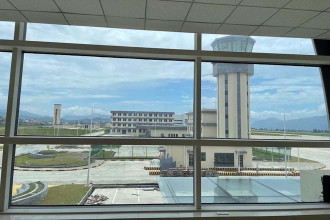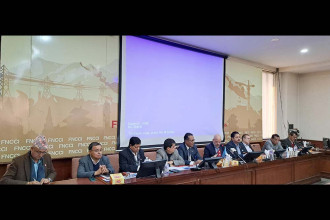KATHMANDU: WWF Nepal, in collaboration with partners, has installed a 14.4 kW Solar Irrigation Plant (SIP) that lifts water from the Bagmati River, providing year-round irrigation for agricultural fields in Pyutar, Lalitpur district.
A total of 54 households with 15.26 hectares of irrigated land in Bagmati Rural Municipality have benefitted from the irrigation plant.
The SIP has also achieved a feat with net metering, which is connected to the national grid and exports surplus energy and imports energy during shortfalls. The project, "Multi-actor partnerships (MAPs) for implementing Nationally Determined Contributions (NDCs) with 100% RE for all in the global south" or "100% RE MAP", aims to introduce and consolidate MAPs with a 100% RE target in three countries: Nepal, Uganda, and Vietnam.
The WWF team organised a field exposure visit with media persons to Pyutar on December 29, 2023. A group including 10 media persons and four representatives from WWF visited the field.
The visit started with an introductory session on the project where Rubina Karki, Programme Associate, Climate and Energy, WWF Nepal, briefed about the visit and the project. This project is funded by the German Federal Ministry for Economic Cooperation and Development and is run in Nepal by Prakriti Resources Centre, according to Karki.
"We want to spread more awareness related to climate change and renewable energy in Nepal, and that is why we need our media partners to be the mediator to take the knowledge to everyone. This capacity-building programme will not only help you to gain knowledge about the project but also broaden the concept of renewable energy as a whole and the opportunities in Nepal," she further explained.
A local partner, Ritavrat Joshi, Senior Programme Officer, MinErgy, stated, "We gave WWF our project proposal. The plant consists of three major sections. One is solar. The other one has a tank at the top and is well down and connected to Bagmati River. The plant has been connected with Rastriya Prasaran Grid, which allows the electricity produced here to be both provided to and taken from the Grid. As a result, energy is not wasted, and irrigation is still possible in the absence of sunlight."
Rajan Sapkota, member of Sichai Pariyojana Samiti, asserted, "Currently, the plant can only assist 34 households while others in the remote distance are unable to receive the service since the local government has not completed fitting pipes."






